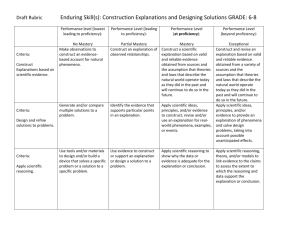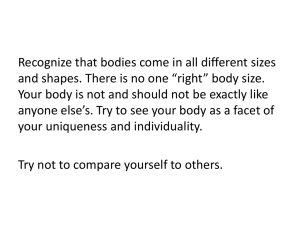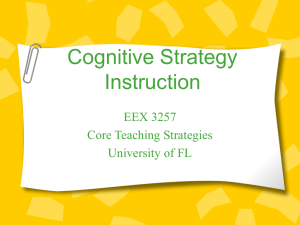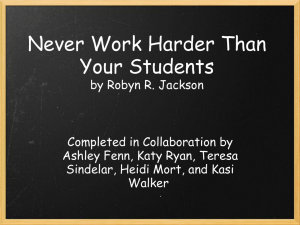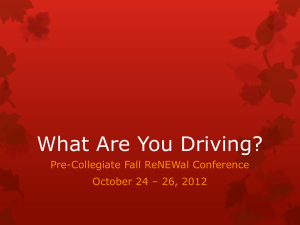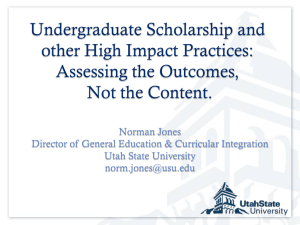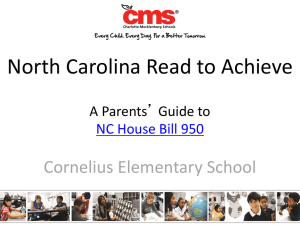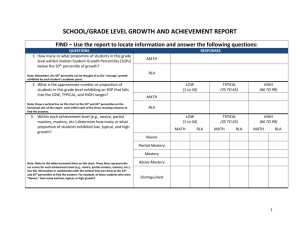Assessment Method Match: Learning Targets Activity
advertisement
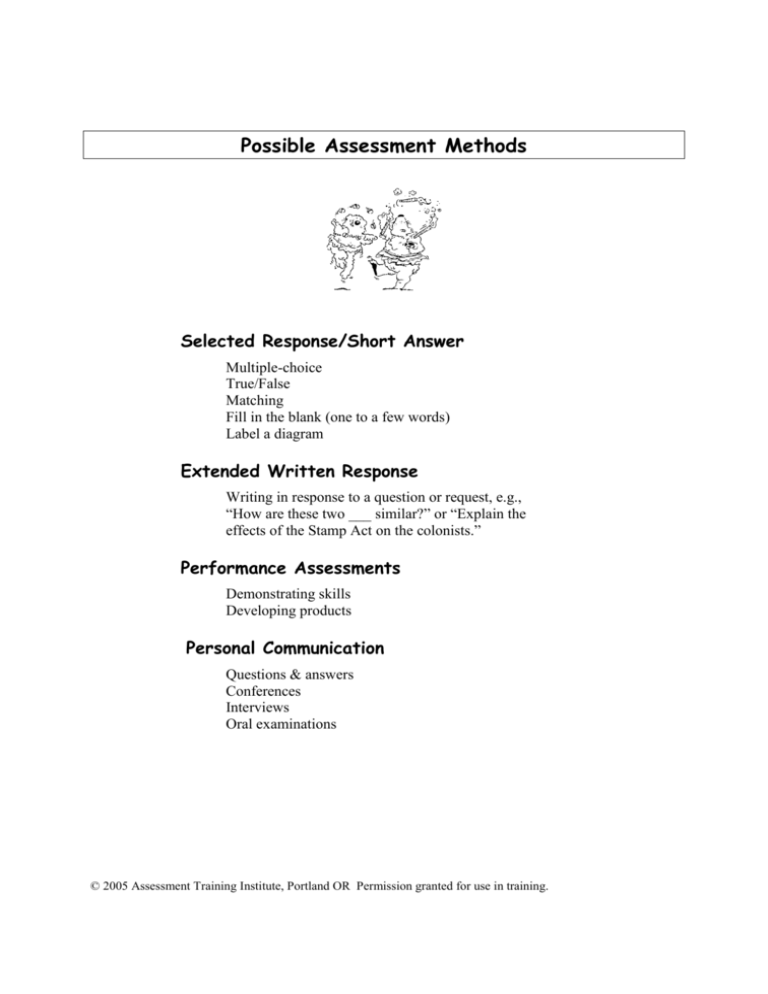
Possible Assessment Methods Selected Response/Short Answer Multiple-choice True/False Matching Fill in the blank (one to a few words) Label a diagram Extended Written Response Writing in response to a question or request, e.g., “How are these two ___ similar?” or “Explain the effects of the Stamp Act on the colonists.” Performance Assessments Demonstrating skills Developing products Personal Communication Questions & answers Conferences Interviews Oral examinations © 2005 Assessment Training Institute, Portland OR Permission granted for use in training. Target-Method Match For this activity, you will determine which assessment method is the best match for each of the four types of learning targets: knowledge, reasoning, skill, and product. To do this you will need to read through the four scenarios in CASL on pages 96-98 (or on the following pages) and record your answer to each question by marking a “Y” in the appropriate box when your answer is “Yes.” Put an “N” in the box if the answer is “No.” You can put a “Y” in more than one box. You can use “Y” to denote really good matches, and a checkmark to denote an acceptable match under certain conditions. To make your choices, think about accuracy and efficiency: which methods will provide the most accurate information with the highest degree of efficiency? Selected Response & Short Answer Extended Written Response Performance Assessment Personal Communication Scenario 1: Knowledge Mastery Scenario 2: Reasoning Proficiency Scenario 3: Performance Skills Scenario 4: Ability to Create Products This is CASL Activity 4.2 , pages 96-99.A blank chart is on the CASL CD in the Chapter 4 file, “Target-Method Match Chart.” © 2005 Assessment Training Institute, Portland OR Permission granted for use in training. WHERE’S THE MATCH? ASSESSING MASTERY OF CONTENT KNOWLEDGE Scenario: Assume you want your students to master some specific subject matter knowledge because it represents an important foundation for later work. To reach this goal, you plan a series of instructional activities to help your students master this required material. Now you want to assess to be sure they’ve got it. In this particular case, you want them to know the material outright, not through the use of reference materials. Question #1: Could you assess mastery of this material using selected response modes of assessment, such as multiple choice, true-false, or matching exercises? Yes or No? Please briefly explain your response. Question #2: Could you assess your students’ mastery of this material using an essay form of assessment? Why or why not? Please write a brief defense. Question #3: If you wanted to assess students’ mastery of content knowledge as specified above, could you use a performance assessment? Yes or No? Defend your answer. Question #4: Do you think the personal communication form of assessment--for example, by oral exam, interview, conference, or discussion--could provide you with a viable assessment of your students’ mastery of this content knowledge? Why or why not? WHERE’S THE MATCH? ASSESSING MASTERY OF REASONING Scenario: In this case, you are a teacher who has seen to it that your students are able to access important knowledge when required. Now you want to see if they can use that knowledge productively to solve relevant problems. You want to see if they can reason analytically (think in terms of similarities and differences), draw inferences, and think critically (take and defend a position on an issue, for example). Question #1: Can you get at these things with selected response assessments? Explain why or why not. Question #2: Does the essay method of assessment work in contexts where we seek to assess reasoning proficiency? Why or why not? Question #3: Is performance assessment a viable alternative when assessing reasoning proficiency? What do you think? Why or why not? Question #4: Can we use personal communication as an assessment method to probe a student’s ability to use knowledge to reason effectively and solve problems? Defend your response. © 2005 Assessment Training Institute, Portland OR Permission granted for use in training. WHERE’S THE MATCH? ASSESSING MASTERY OF SKILLS Scenario: Let’s assume that you teach French and wish to assess your students’ skill at communicating in that language in a conversational situation. So the skill of oral language proficiency is your target. Question #1: Can you assess oral language proficiency in a conversational context using a selected response mode of assessment? Why or why not? Defend your answer. Question #2: Can you assess these skills using an essay form of assessment? Yes or No. Why? Question #3: Will performance assessment work as a basis for assessing the foreign language speaking proficiency of your students? Why? Question #4: Can you use personal communication as a basis for assessing conversational skill in a second language? Defend your response. WHERE’S THE MATCH? ASSESSING ABILITY TO CREATE QUALITY PRODUCTS Scenario: You want your students to be able to create quality products--products that meet certain specified standards. They might be written products such as term papers, technology products that are of high and low quality. You have provided practice in developing products that meet your standards. Now it is time to assess the students’ achievement to see if your instruction was effective. Question # 1: Can you assess the ability to create these kinds of products using selected response modes of assessment? Why or why not? Question #2: Will essay assessment work for evaluating this kind of achievement? Explain. Question #3: Can performance assessment provide the evidence of proficiency needed to evaluate this kind of achievement target? Defend your response. Question #4: Is personal communication a viable way to assess when products serve as the source of evidence of proficiency? Yes or no? Why? © 2005 Assessment Training Institute, Portland OR Permission granted for use in training.
